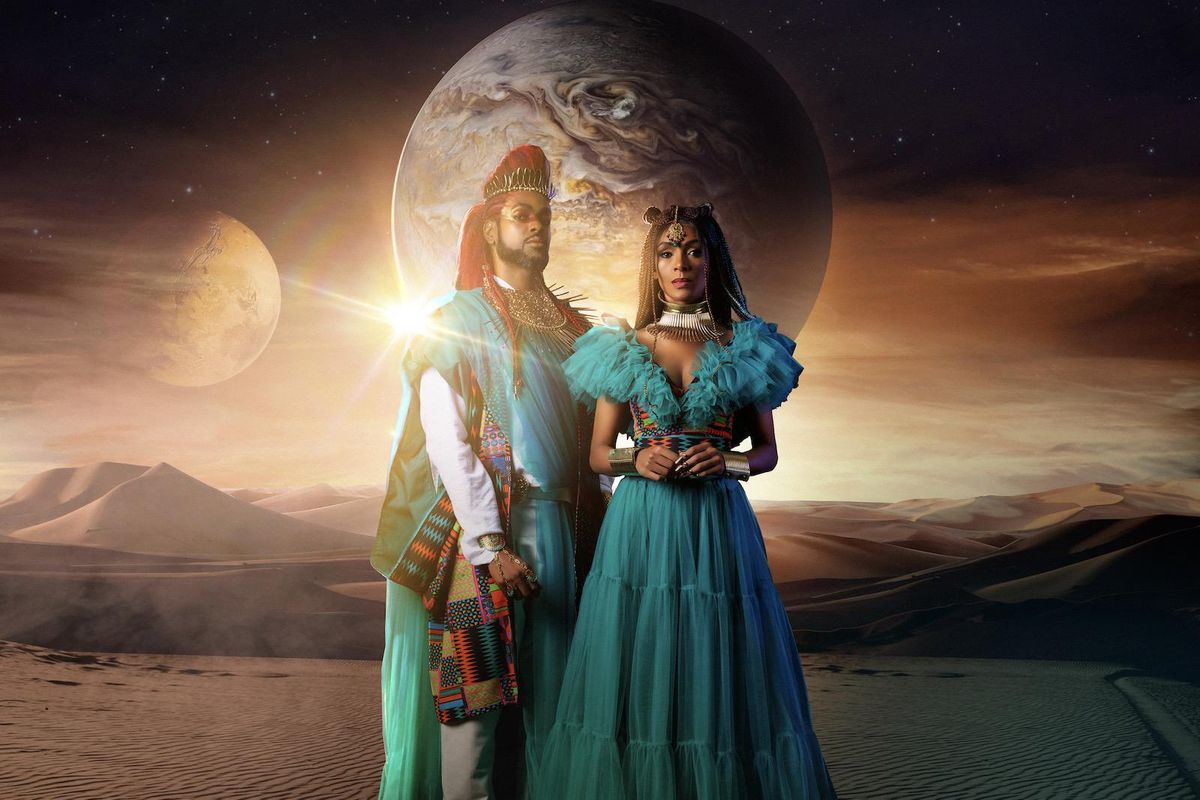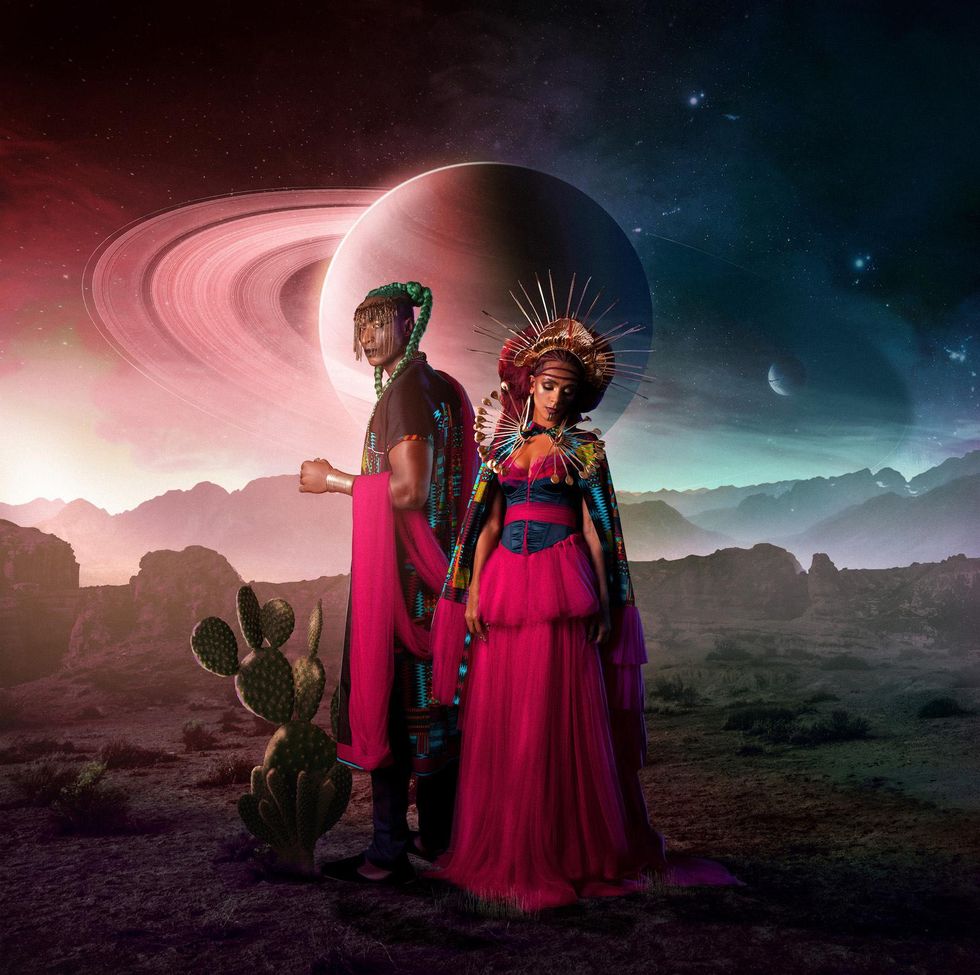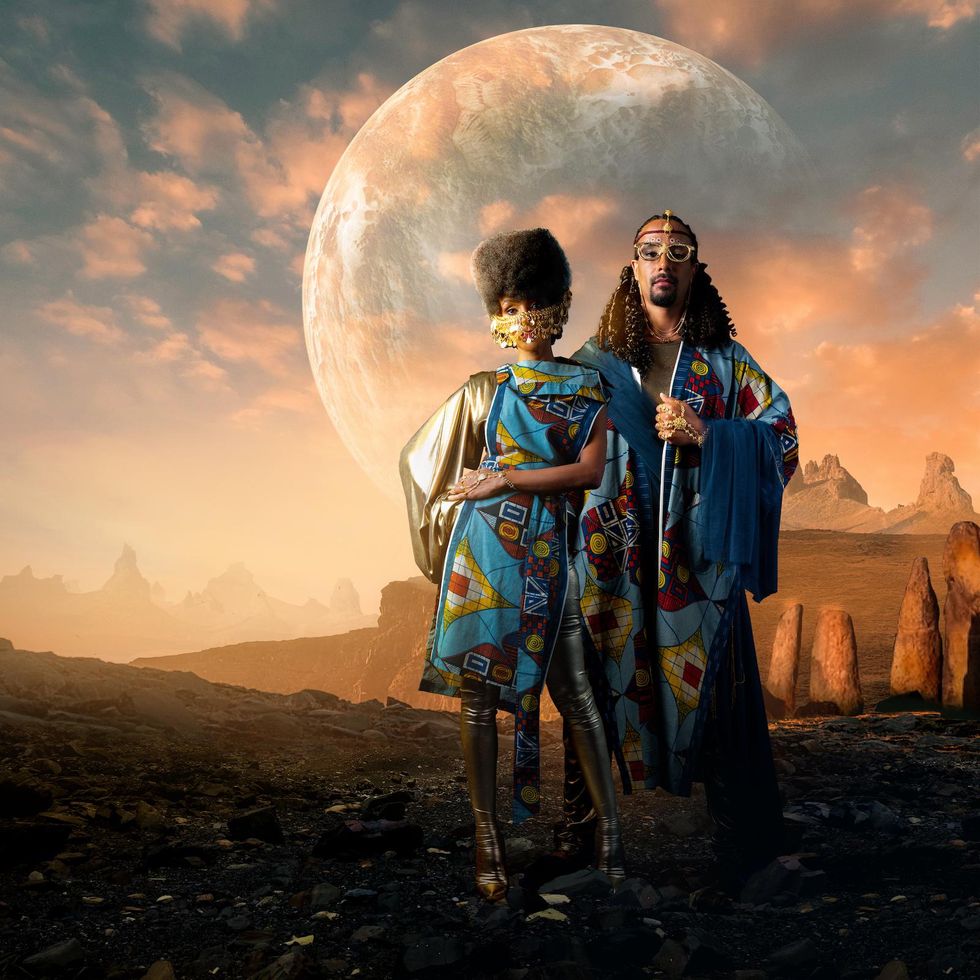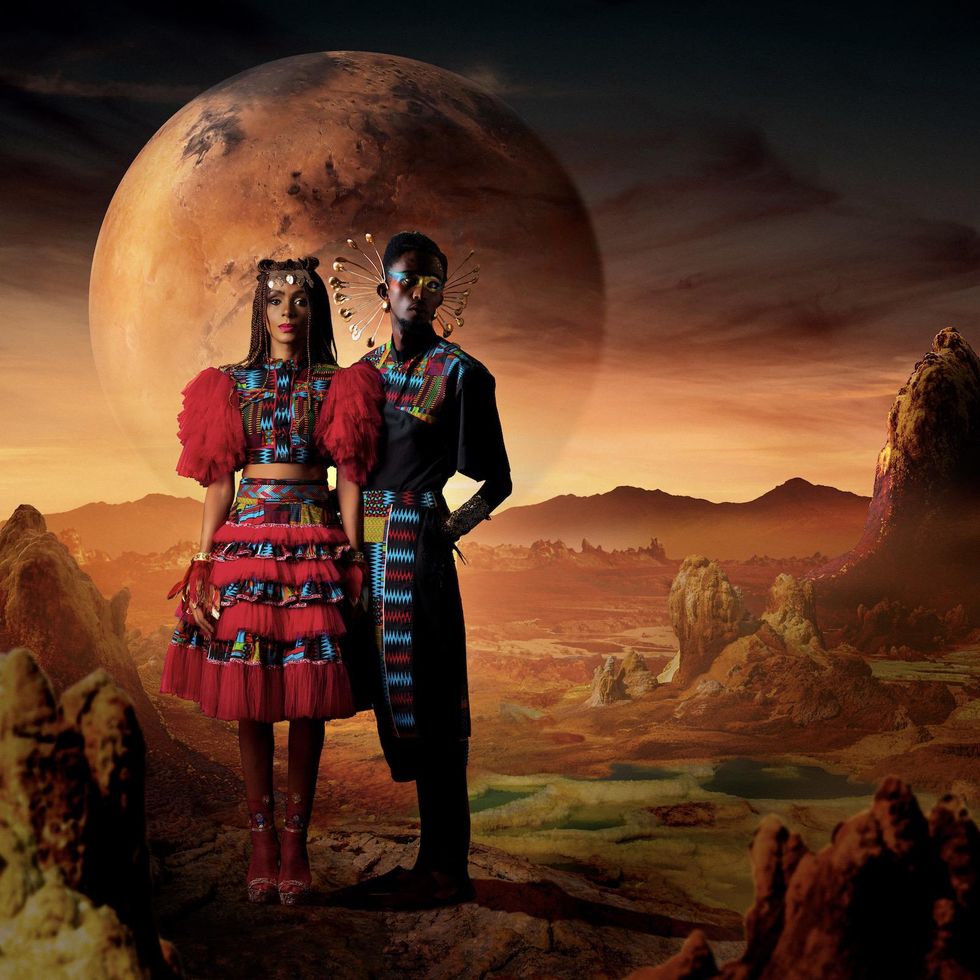Pan-African Streetwear Label Finchitua Goes Intergalactic
Finchitua's newest capsule collection is a dive into future fantasy.

Feiruza Mudessir is in her creative studio in Dubai, a picture of contained nervous energy, surrounded by the organized chaos of her designs. She is the brand owner and head designer of Finchitua, a label producing distinctly pan-African streetwear. Until now, they have delivered exuberant denim clothing that is cut fearlessly, acid-washed, and then adorned with tribal designs: where '90s hip-hop meets the ancient and colorful patterns of Mudessir's Ethiopian heritage. Her latest collection charters new territories. Finchitua, it seems, has gone intergalactic. Exploring the fabric of Outerspace.
Mudessir is well-poised, but under this polished surface, I sense that distractions from the steely focus she keeps on her business gnaw away at her. There are things to do. It is unsurprising, as from the age of 13 she has been facing the world more alone than others do. She may have had the privilege of a boarding school education in India but after being sent off with her sister, she has largely been cut off from her parents.
There is no hiding how much her clothes are wrapped in the sense of her own forged identity. These designs not only keep her rooted in her heritage but tell the world of her own personal journey. "I want people to know where I am from through the fabrics and patterns of Ethiopia, India, and the UAE," she says. "And if people say 'I love it but where am I going to wear it?' I simply tell them that you don't need a special occasion to wear something beautiful. Stand up and be yourself."
Finchitua's newest capsule collection teams Mudessir with Fanuel Leul, a graphic designer and contemporary artist based in Addis Ababa, who has helped create the future fantasy that draws from Mudessir's own diasporic experience. His take on Afro-futurism, a term coined by Mark Dery in 1994, is one that he uses to embolden himself and those that he sees suffer around him. A vision that takes the clothing range to a deep space dimension. Sat in shadows from his own studio he tells me "Ethiopia feels closed. Here we cannot connect easily with foreigners or even our neighboring countries. You can't get payments from abroad as we don't have access to an international banking system. Young people are struggling to travel or even connect with the world. We are suffering from an oppressive political system."
Fanuel has been immersed in the recent drama of inter-communal and inter-ethnic conflicts that have ravaged his country. The violence and economic destabilization plunging many Ethiopians into despair. The escapism he produces adds credibility to Mudessir's technocultural twist on celebratory outfits from all across Africa.
It was in lockdown that Mudessir made the future-facing leap that would lead her to collaboration with Leul. "I was forced indoors and cutting from home just as the BLM movement started going off. All the talk of supporting black businesses inspired me to focus on something bigger than I ever had before," she says. "It made me look at different tribes and cultures from across the continent. I looked to West Africa to see what people wore at weddings and thought to translate that to the street. How people dressed at these big events across the whole continent became a huge influence on me and I started recreating them in my own way." When she began to research Afro-Futurism, Fanuel's work stood out. "I didn't even know that he was Ethiopian at first, which made it very special for me." This new capsule collection allows both Mudessir and Fanuel to explore an alternate reality together. Mudessir's asymmetrical garments hang like symbols of unity in proud defiance. Fanuel unlocks the fantasy of a utopian world.
Fanuel admits that the concept of Afro-futurism was only introduced to him in 2018 when Marvel's Black Panther was released. It made him realize just how underrepresented Africans were in movies. "We have so many stories to be told and even when they are - visually, the art production and budgets are always low," he said. From then on, Fanuel has gone about trying to implement change. He delved back to the abstract dreams of the originators of this movement from the 1950s to the genius of Sun Ra and Lee Scratch Perry who delivered in deep vibrations and chaos, not only otherworldly music but a message of empowerment that would reverberate into an endless future. As Sun Ra said "I came from a dream that the black man dreamed long ago. I'm actually a presence sent to you by your ancestors." Fanuel is currently designing superheroes for an upcoming international movie production and has had his work featured in an Afro-futurist festival in Carnegie Hall, New York alongside his new idol Ytasha Womack.
For Mudessir, it is no longer enough to just focus on helping people stand out from the crowd. If she fulfills her yearning to physically return to her birthplace and to take her journey full circle it will be to start a production house in Ethiopia. Her goal is to support local businesses and to create a handwoven, sustainable collection made by local artisans with organic cotton. As for Fanuel, when I ask him how he sees the future for young people, like himself in Ethiopia he says "Last year was very hard - artists and political activists have been killed and we have lived in total drama...I am not that hopeful that there will be great change, but young people can't sit and wait for change, we must continue to fight."
Photo credits for the images throughout this article are as follow:
Photographer: @aography
Editor: @fanuel_leul
MUA : @eva.makeupwiz / @joseqart2Location: @kizadubai
Hair: @glamqueendubai
Model : @Clint_malik , @Flo_akinbiyi , @Laynered @king_mattheyu & @Feiruzamudessir
- 14 Ethical & Sustainable African Fashion Brands You Need To ... ›
- 11 Women-Led African Fashion Brands Making a Global Impact ... ›
- Here Are 5 Places Where You Can Buy African Fashion Online ... ›
- Watch: Sarah Diouf's 'Made In Africa' Documentary Offers Inspiration ... ›
- Vogue Africa? These 12 Homegrown Publications Are Already ... ›
- South African Fashion Label Maxhosa Stands Out in Upcoming ... ›
- Top Ten African Menswear Designers - OkayAfrica ›
- 8 Recent Times Luxury Fashion Brands Used African Designs ... ›
- Here's Every African Designer Beyoncé Wore During Her Trip to ... ›
- How Fashion Historian Teleica Kirkland Is Transforming What We ... ›
- Spotlight: Meron Mamo is Putting Ethiopian Clothing on the Map - OkayAfrica ›




